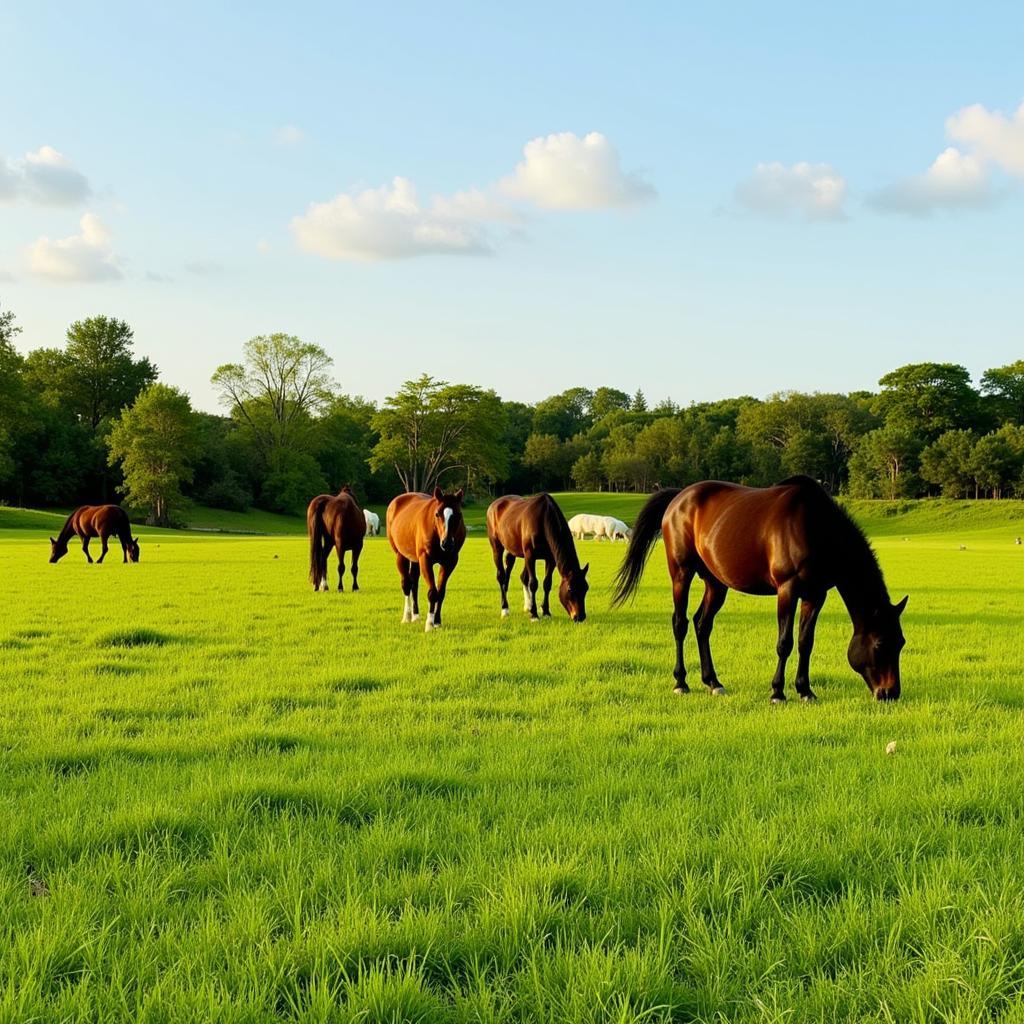Bahia grass is a warm-season perennial grass popular in the southern United States. It’s known for its hardiness, drought tolerance, and ability to thrive in poor soil conditions. But is Bahia Grass For Horses a good idea? Let’s take a deeper look at this readily available forage option.
Bahia Grass Nutritional Value for Horses
Bahia grass can provide adequate nutrition for horses when managed properly. It’s generally lower in calories and protein compared to cool-season grasses like orchardgrass or timothy hay. Mature Bahia grass can be quite high in fiber, which is good for digestive health. However, it can also mean lower digestibility and reduced nutrient absorption.
Here’s a closer look at the nutritional content of Bahia grass:
- Protein: 7-12% (can be lower in mature grass)
- Fiber: 50-60%
- Calcium: Moderate
- Phosphorus: Low
While the protein and fiber content align with a horse’s basic needs, it’s important to understand that these values can vary significantly depending on factors like:
- Maturity of the grass at harvest: Younger Bahia grass has higher protein levels than more mature stands.
- Soil fertility: The richer the soil, the more nutritious the grass.
- Fertilization practices: Regular fertilization can boost the nutrient content.
 Horses Grazing on Bahia Grass Pasture
Horses Grazing on Bahia Grass Pasture
Potential Downsides of Bahia Grass for Horses
While Bahia grass can be a suitable forage option for horses, there are a few potential drawbacks to consider:
- Risk of Bahia Grass Staggers: Bahia grass can harbor a fungus that produces toxins (ergopeptine alkaloids) which can interfere with a horse’s nervous system. This condition, known as “Bahia grass staggers,” can cause a range of neurological symptoms, including:
- Loss of coordination
- Muscle tremors
- Difficulty eating or drinking
- In severe cases, collapse or even death
- Lower Palatability: Compared to some other grasses, horses may find Bahia grass less appealing, particularly when it matures and becomes more stemmy. This can lead to reduced grazing and potential weight loss.
- Potential for Impaction Colic: The high fiber content of mature Bahia grass, combined with its lower palatability, can increase the risk of impaction colic, especially in horses that are prone to this condition.
Best Practices for Feeding Bahia Grass to Horses
If you choose to feed your horse Bahia grass, there are some important steps to minimize the risks:
- Choose Certified Seed: When establishing a Bahia grass pasture, opt for certified seed that’s less likely to contain the fungus associated with Bahia grass staggers.
- Avoid Overgrazing: Don’t allow horses to graze Bahia grass too closely. This can stress the plants, making them more susceptible to fungal growth. Rotate pastures regularly to prevent overgrazing.
- Dilute with Other Forages: Mix Bahia grass hay with other types of hay to provide a more diverse diet and reduce the risk of your horse consuming excessive amounts of any one type of grass.
- Monitor Your Horse Closely: Watch for any signs of illness, particularly neurological problems like those associated with Bahia grass staggers. If you see any abnormal behavior, contact your veterinarian immediately.
Alternatives to Bahia Grass for Horses
If you have concerns about feeding Bahia grass to your horses, plenty of alternative forage options are available:
- Coastal Bermudagrass: Another warm-season grass, coastal Bermudagrass, is generally more palatable to horses and has a lower risk of toxicity.
- Timothy Hay: A highly palatable and easily digestible cool-season grass, timothy hay is a good option for horses with sensitive stomachs or those prone to colic.
- Orchardgrass Hay: Another palatable cool-season grass, orchardgrass hay, is higher in calories and protein than timothy hay.
- Alfalfa Hay: A legume hay, alfalfa is very nutrient-rich and high in protein and calcium.
The best type of hay for your horse will depend on factors such as:
- Age: Growing horses, senior horses, and pregnant or lactating mares have different nutritional needs.
- Activity level: Horses used for riding, driving, or other activities will need more calories than those that are primarily used for pleasure or companionship.
- Health status: Some horses have specific dietary needs due to health conditions such as Equine Metabolic Syndrome (EMS), Cushing’s disease, or insulin resistance.
 Veterinarian Examining a Horse in a Pasture
Veterinarian Examining a Horse in a Pasture
Making Informed Decisions about Horse Forage
Bahia grass can be a viable forage option for horses in some situations. But it’s not without its risks. Understanding the potential drawbacks and implementing best management practices is crucial. Consult with your veterinarian or an equine nutritionist to determine if Bahia grass is an appropriate choice for your horse. They can help you create a balanced diet that meets your horse’s individual needs and helps ensure its long-term health and well-being.
For more information on horse care, be sure to check out our articles on dandruff horse lice, fly boots horses, and anti itch shampoo for horses. You might also find our resources on horse stall scratchers and horse shedding helpful.
Need personalized advice for your equine friend? Reach out to Justus Horses USA. Call us at 0772127271, email us at [email protected], or visit us at QGM2+WX2, Vị Trung, Vị Thuỷ, Hậu Giang, Việt Nam. Our dedicated team of horse experts is here to provide 24/7 support.